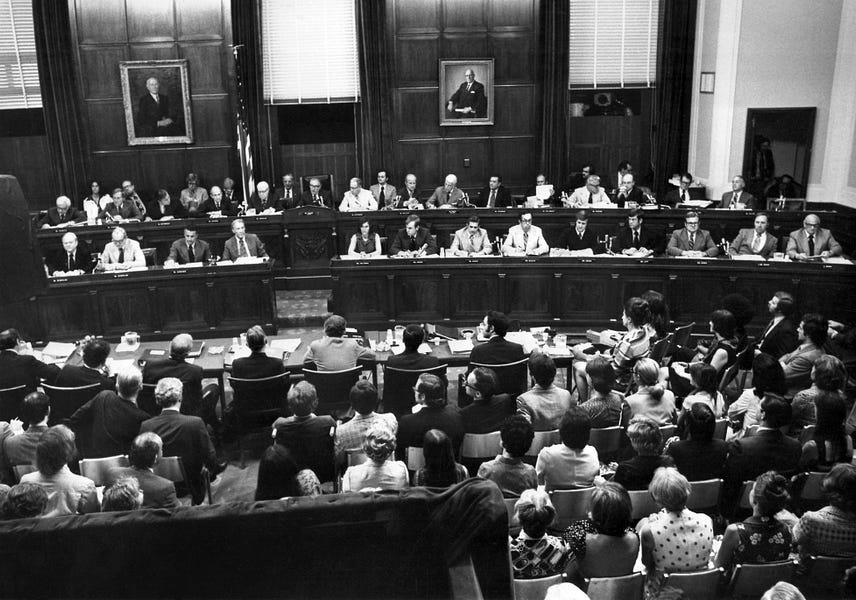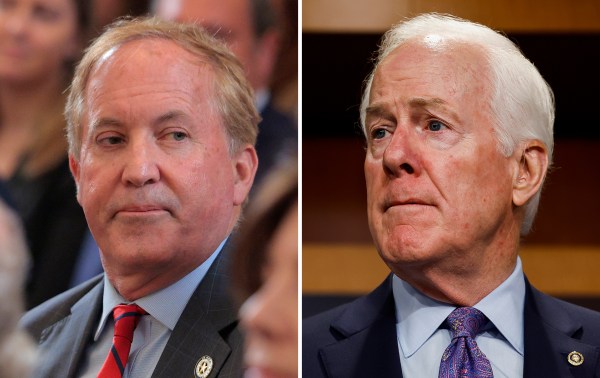In early August 1973, Paul Harvey used his nationally syndicated column to defend President Richard Nixon as impeachment proceedings began in Congress.
Harvey, a conservative who had previously been critical of Nixon for extending the war in Vietnam, laughed at the charge that Nixon had been involved in “political chicanery,” noting that he had seen far worse behavior among politicians.
“Election after election I’ve watched machine politicians play the game the way the city’s electorate expects,” Harvey wrote of his native Chicago. He said he had seen local party officials “tilt the voting machines; vote winos for four bits and dead people for free; lose enough ballot boxes to reverse a defeat,” adding that the “pomposity and sanctimony of some politicians in this present instance make me sick!”
Yet like many others in the conservative movement, Harvey’s cringeworthy paean to Watergate whataboutism would not affect his future career prospects. Within three years, he would launch his “Rest of the Story,” radio feature, spinning avuncular, folksy tales of cultural oddities.
Like Harvey, many prominent Republicans would go on to enjoy successful post-Watergate careers, easily sidestepping the possible taint from their vigorous Nixon defenses. And some of Nixon’s critics within the GOP would quickly vaporize, their presidential aspirations vanishing under charges of disloyalty.
Among Nixon’s other defenders was California Gov. Ronald Reagan, who at a banquet in November 1973 said Nixon had been the target of a “concerted effort in Washington to undermine him and make it appear he is not fit to govern.”
“There are some who would destroy a man in order to destroy a mandate of all the people,” argued Reagan, who claimed Nixon had done nothing wrong and the Watergate burglars were not “criminals at heart.”
At a meeting of the Southern GOP Conference in December, Republican National Committee chairman George H.W. Bush told the group there was “no real pressure” for Nixon to resign and that calls for impeachment had been “orchestrated” by consumer advocate Ralph Nader and labor leaders.
“Get off his back and let the man do the job he was elected to do!” Bush told the crowd in Atlanta.
(In a Trumpian rhetorical flourish, Bush mocked impeachment talk from “that zany voice from under that big, floppy hat,” referring to New York feminist congresswoman Bella Abzug.)
At the time of both the Reagan and Bush defenses, the House had already conducted impeachment hearings, where White House lawyer John Dean had testified the president was involved in a cover-up of the Democratic National Committee headquarters burglary. Nixon had recently declined to turn over his taped White House conversations to special prosecutor Archibald Cox, had fired Cox in the “Saturday Night Massacre,” and had uttered his memorable “I am not a crook” defense.
And yet, as the summer of 1973 ended, more than 60 percent of Americans still opposed impeachment. This fact was not lost on GOP leaders, who continued to dig in on behalf of their president.
Such loyalty is a historical lesson heeded by some current conservatives, whose contortions in backing President Donald Trump are simultaneously baffling and laughable. Senators who once bitterly opposed Trump now trample others to get in front of cameras to defend him. Former Trump administration officials who once gave speeches warning against the impulse to govern by triggering Democrats have now commenced what can only be called an “owning the libs” world tour in defense of Trump.
As Trump’s defenders have learned, America is forever making more past. As more news stories roll in, the Trump era will soon seem like a quirky relic from the past, their unconscionable defenses dissipating.
But as in the case with Watergate, those who cross Trump may forever feel the effects in a party that has succumbed to the president’s will.
Take the case of moderate Republican Illinois Sen. Charles Percy, who in 1973 appeared to be on the fast track to the White House. A Harris poll conducted in June of that year placed Percy ahead of every other candidate, including Sen. Ted Kennedy, Vice President Spiro Agnew (who would soon resign independent of the Watergate scandal), and Ronald Reagan.
William F. Buckley, who remained unimpressed with Percy, called him “the lushest bloom of the medium-to-left spectrum of the Republican Party,” but predicted Percy’s opposition to Nixon “could remove him from the fallout that, before Watergate is finally over, could poison those who were nourished under Mr. Nixon’s mushroom cloud.”
In October 1973, Percy, no doubt with an eye on the White House, defended Nixon, saying it was time for “Republicans to stand together.” In February, during a Chicago banquet at which he expressed his interest in running for president, Percy said the Nixon administration should be praised for everything but the “tragic excesses of Watergate.”
But by March, Percy was telling the Republican Party to disassociate itself from the Watergate scandal, suggesting the party would be better off if Nixon resigned.
“I think it is important that we deal with the real world, with the political facts of life if we are to avoid political disaster and achieve, instead, victory at the polls,” Percy told the Midwest GOP Leadership Conference in Chicago. Percy warned the Republican Party was on its way to becoming the “Avis” of political parties, referring to the rental car company’s “We’re No. 2” advertising campaign at the time.
Nixon, of course, had no particular love for Percy, with whom he had battled for years. During a Cabinet meeting with senior White House aides in mid-1973, Nixon said Percy would never be president “as long as I have anything to say about it.”
Nixon was right.
Soon, the content of Nixon’s audio tapes was released, Republican Party leaders turned against him, and Nixon resigned. Vice President Gerald Ford took over the presidency on August 9, forcing Percy to run against Ford in a Republican primary if he sought the presidency.
In announcing his decision not to run, Percy bitterly criticized Ford’s decision to pardon Nixon, saying it “reinforces the cynicisms of millions of Americans,” especially young persons. Rather than healing the wounds of Watergate, Percy said the pardon “exacerbated those wounds.”
Nevertheless, Percy’s star dimmed quickly, while Ronald Reagan’s profile increased. As Reagan ran against Ford in the 1976 primary, he only sporadically addressed Watergate. In March of that year, George Will noted that “if prior to August 9, 1974, Mr. Reagan came to believe that Mr. Nixon had done something unpardonable, Mr. Reagan was not boisterous in advertising that belief.”
“Mr. Reagan has never been what you would call obsessed with Watergate,” Will wrote.
It was, in part, Reagan’s feigned lack of interest in Watergate that kept his political future alive within the Republican party. His refusal to openly condemn Nixon comforted the base of the GOP that always believed Nixon got a raw deal—even late into 1974 the bitter-enders flooded editorial boards blaming Nixon’s downfall on the hypocritical liberal media.
But it serves as a lesson to any Republican in 2020 who has political aspirations: At some point, today will be yesterday. And yesterday will be last month. And last month will be years ago.
It is why many Republicans in the Senate bite hard and pretend Donald Trump is a fit president. As Heraclitus noted, no man steps in the same river twice—in the future, it will be a different river, with different currents. The goal of Trump’s defenders is to avoid drowning in that river before they get the chance to swim in more welcoming waters in the future.
And who will take control of the future of the party by being sufficiently obeisant to Trump? That, of course, is the rest of the story.
Christian Schneider is a reporter for The College Fix and author of 1916: The Blog.
Photograph of the House Judiciary Committee proceedings on Watergate, July 1974, by AFP via Getty Images.






Please note that we at The Dispatch hold ourselves, our work, and our commenters to a higher standard than other places on the internet. We welcome comments that foster genuine debate or discussion—including comments critical of us or our work—but responses that include ad hominem attacks on fellow Dispatch members or are intended to stoke fear and anger may be moderated.
With your membership, you only have the ability to comment on The Morning Dispatch articles. Consider upgrading to join the conversation everywhere.